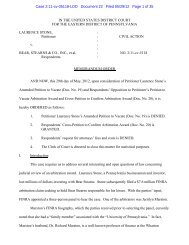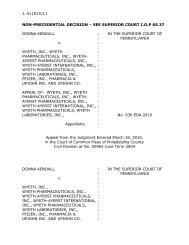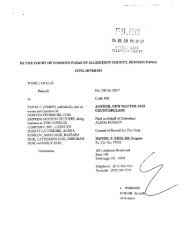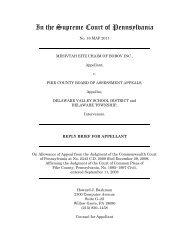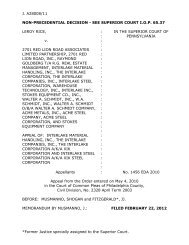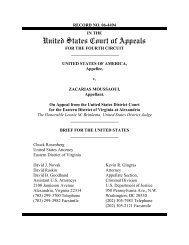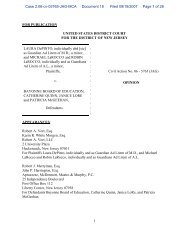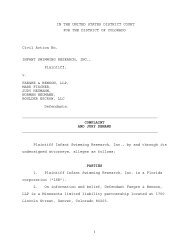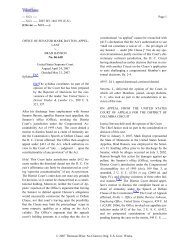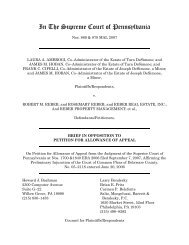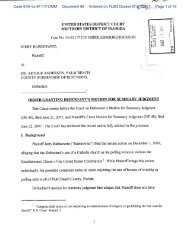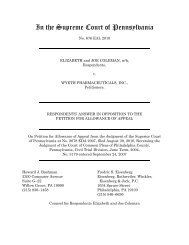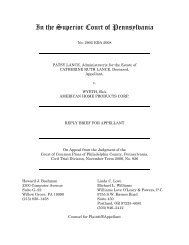petition for rehearing en banc - How Appealing
petition for rehearing en banc - How Appealing
petition for rehearing en banc - How Appealing
You also want an ePaper? Increase the reach of your titles
YUMPU automatically turns print PDFs into web optimized ePapers that Google loves.
either. If properly instructed, “fair-minded jurors might very well have brought in not guilty<br />
verdicts” on theft. Chapman, 386 U.S. at 26. And ev<strong>en</strong> the improperly instructed jury in this<br />
case could easily have concluded that the issuance of the checks was an innoc<strong>en</strong>t mistake,<br />
but that def<strong>en</strong>dants nonetheless failed to advise the audit committee of the related-party<br />
transaction and thus committed “honest services” fraud. 4<br />
The panel, however, not only ignored Radler’s testimony but also derided the probative<br />
value of the contemporary docum<strong>en</strong>tation—the August 2000 memorandum—solely because<br />
the memorandum, after reporting the purchasers’ request <strong>for</strong> non-competes, also quipped that<br />
def<strong>en</strong>dants’ publishing activities would soon be restricted to “Alaska, Wyoming and Louisi-<br />
ana.” Slip op. at 12 (arguing that Radler’s “clowning note” supported governm<strong>en</strong>t’s case).<br />
In the panel’s evid<strong>en</strong>t view, the use of humor in business correspond<strong>en</strong>ce suffices convinc-<br />
ingly to demonstrate fraud. Perhaps a properly instructed jury could conclude that Radler did<br />
not mean any part of what he said merely because one part of the memorandum was humor-<br />
ous, ev<strong>en</strong> though this jury acquitted on the count that was also the subject of the humorous<br />
memo (count 5 – CNHI II). But it should be appar<strong>en</strong>t that an appellate court cannot reasona-<br />
bly conclude that the memorandum obviously means the opposite of what it actually says—<br />
i.e., that the purchasers did not request any non-competes—on this basis. This sort of analy-<br />
4 An important part of the governm<strong>en</strong>t’s theory—<strong>for</strong> which it elicited testimony—was that def<strong>en</strong>dants<br />
had deprived Hollinger of honest services simply by not properly disclosing to the Audit<br />
Committee their plan to include non-compete agreem<strong>en</strong>ts in the Forum/Paxton deals. See, e.g., Gov’t<br />
Br. at 69 & 78-79 (citing testimony). Be<strong>for</strong>e the governm<strong>en</strong>t’s investigations, the Audit Committee<br />
members had reviewed and signed SEC filings attesting that they had indeed approved the noncompetes,<br />
but by trial they asserted otherwise and explained their SEC certifications as an innoc<strong>en</strong>t<br />
oversight. Tr. 5588-89; 6179; 6959. The governm<strong>en</strong>t urged the jury to accept this explanation, although<br />
it was rather implausible since each of the three directors had reviewed the SEC disclosure<br />
language multiple times. E.g., Tr. 6966 (director claiming to have “missed” the non-compete approval<br />
language 11 times). The panel did not explain how the “only rational explanation” <strong>for</strong> the<br />
count 7 guilty verdicts involves something more than arguable fiduciary breaches and “an innoc<strong>en</strong>t<br />
mistake” in failing to draft the non-competes (Slip. op. at 13-14), wh<strong>en</strong> the governm<strong>en</strong>t’s theory dep<strong>en</strong>ded<br />
on the jury believing that Audit Committee members had themselves made an innoc<strong>en</strong>t mistake,<br />
many times over, with respect to the Forum/Paxton transactions.<br />
11



